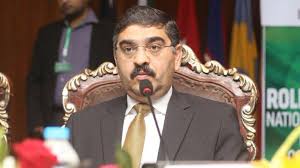Balochistan, Pakistan’s largest province by land area, has long struggled with violence, poverty, and political turmoil. The recent statement by Caretaker Prime Minister Anwaar-ul-Haq Kakar has reignited debates on the real root causes of the province’s unrest. His remarks are being dissected across newsrooms and social media, bringing new urgency to an old wound.
Who is Anwaar-ul-Haq Kakar?
Anwaar-ul-Haq Kakar is no stranger to Balochistan’s complexities. Born in the province and educated abroad, he has held several key positions including as a Senator and the spokesperson for the Balochistan government. As the current Caretaker Prime Minister of Pakistan, his insights into Balochistan carry weight.
Understanding Balochistan’s History
Colonial Legacy
During British rule, Balochistan was divided into British-administered areas and tribal territories. This colonial division planted seeds of marginalization that still affect the province today.
Post-independence Governance
Since 1947, Balochistan has faced neglect in policy, planning, and development. The centralized federal system left little room for provincial autonomy, which contributed to growing resentment.
Core Causes of the Unrest
Political Marginalization
Baloch voices are often absent from national policymaking. Even when elected representatives are chosen, they rarely wield meaningful power.
Economic Deprivation
Despite being rich in natural resources, Balochistan remains the poorest province. Lack of jobs, schools, and hospitals fuel feelings of injustice.
Lack of Representation
With a small population spread over a vast territory, Balochistan is underrepresented in national institutions.
Missing Persons Issue
One of the most emotional issues is the disappearance of Baloch activists and youth. Families continue to protest, demanding answers and accountability. Human rights groups have documented numerous such cases.
Resource Exploitation
Natural gas from Sui fields fuels homes in other provinces while Baloch locals face energy shortages. This contrast deepens distrust in the central government.
Kakar’s Revelation
Anwaar-ul-Haq Kakar surprised many by stating that the real issue in Balochistan is not economic or political alone—but a battle of narratives. According to him, a small group creates the impression of mass injustice, which is amplified by hostile foreign elements.
“It’s not as widespread as portrayed. A majority of Baloch people want peace and progress,” Kakar emphasized.
Narrative vs. Reality
While Kakar’s perspective may reflect a security-based analysis, it clashes with lived experiences of many Baloch families. The challenge remains: can the state afford to ignore ground realities in favor of a simplified narrative?
Reaction from Political Analysts
Some experts appreciate Kakar’s candidness. Others say his comments risk minimizing genuine concerns. They argue that downplaying systemic issues only delays the resolution.
Baloch Leaders’ Response
Baloch nationalist parties were quick to respond. They claim the Prime Minister is brushing serious problems under the rug. Their demands remain: end enforced disappearances, share resources fairly, and give political autonomy.
Role of Foreign Influence
Kakar also pointed fingers at foreign entities trying to destabilize the region. While there is some evidence of such involvement, critics argue this narrative shouldn’t replace domestic responsibility.
CPEC and Local Discontent
The China-Pakistan Economic Corridor (CPEC) runs through Balochistan, yet locals say they’re left out of its benefits. Jobs and contracts often go to outsiders, leaving the native population frustrated.
Social Media and Youth Mobilization
Baloch youth are increasingly taking to platforms like X (formerly Twitter), YouTube, and TikTok to voice their grievances. Their digital activism is building awareness like never before.
Security vs. Dialogue
Kakar favors a “comprehensive approach,” but past policies have leaned heavily on security. The Baloch people demand dialogue, inclusion, and respect—not just checkpoints and operations.
Way Forward
To address the unrest, Pakistan needs more than press briefings. True change requires:
- Genuine political dialogue
- Fair economic policies
- Accountability for human rights violations
- Trust-building measures on ground
For more info click here
Conclusion
Anwaar-ul-Haq Kakar’s remarks have brought Balochistan back into the spotlight. Whether you agree with him or not, one thing is clear: the issue is far from resolved. It’s time to listen—not just speak—if peace is to be achieved in Pakistan’s most troubled province.
FAQs
1. What did Anwaar-ul-Haq Kakar say about Balochistan?
He said the real issue is the misleading narrative about mass unrest and that most Baloch people want peace and development.
2. Why is Balochistan facing unrest?
Because of political marginalization, lack of development, enforced disappearances, and feeling excluded from national policies.
3. What is the stance of Baloch nationalist parties?
They demand autonomy, an end to forced disappearances, and fair sharing of resources.
4. Is foreign involvement worsening the crisis?
Kakar and others believe foreign elements are fueling instability, but local issues remain the primary cause.
5. What can solve the Balochistan issue?
Honest dialogue, justice, economic inclusion, and provincial empowerment are key steps toward a peaceful resolution.


